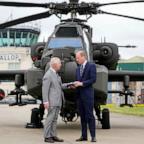Border traffic plunges under passport policy
— -- The number of people crossing the northern and southern land borders into the USA has dropped sharply since a passport requirement began June 1.
Businesses in tourism-dependent border communities blame the policy for making a bad year worse.
At Martin's Fantasy Island, an amusement park in Grand Island, N.Y., about 10 minutes from the Canadian border, "our Canadian business is way off," spokesman Mike McGuire says. Nearly one-third fewer Canadian families of four have come for discounted "Canadian Wednesdays" compared with last year, he says. He blames the recession, a soggy summer and the passport rule.
The park is in the Buffalo border crossing region, which saw a 13% decline in privately owned vehicles coming into the USA in June and July compared with the same period last year, according to U.S. Customs and Border Protection (CBP). Along both borders, traffic was down 12.5%.
The change is part of the Western Hemisphere Travel Initiative, an effort to make borders more secure after 9/11. The rules affect U.S. citizens entering by land or sea, who once could get across by simply declaring themselves citizens. The change also affects citizens of Canada and Bermuda, who previously did not have to show passports.
Now, they must have passports or a handful of other documents including enhanced driver's licenses, which have more security features and are available in some Canadian provinces and Michigan, New York, Vermont and Washington.
The passport rule went into effect at airports in 2007. The rules for Mexicans have not changed; they have long needed special border crossing cards or passports plus visas.
CBP officials say the change has made border crossings safer and more efficient and isn't to blame for declining numbers. Fewer people have been coming to the USA via land borders since 9/11, says Colleen Manaher, initiative director.
Compliance has been high; 95% of affected travelers arrive at the borders with proper documents, she says. "You have to look at this in totality," she says. "There is the recession, exchange rates, gas prices. There's border violence, there's weather."




